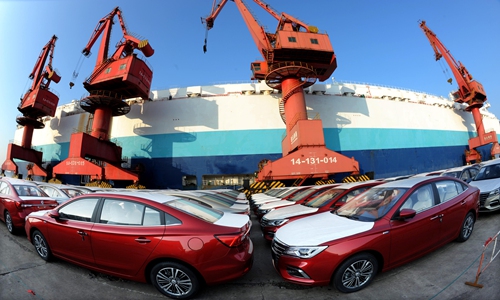HOME >> SOURCE
Key East China port for trade with Japan, South Korea anticipates slowing trade amid coronavirus outbreak
By Chu Daye Source:Global Times Published: 2020/2/26 23:15:57

A total of 500 domestically manufactured vehicles wait to be loaded onto a ship at the Port of Lianyungang, East China's Jiangsu Province, on Monday. The cars are being exported to the Netherlands. The port saw 648.34 million vehicles exported in 2019, up 211 percent year-on-year. Photo: cnsphotos
A key Chinese port in East China's Jiangsu Province expects bleak trade figures in the coming months after reported surges in novel coronavirus infections in Japan and South Korea.
Lianyungang Port, a port that occupies a key spot in the seamless cross border supply chain between China, Japan and South Korea, is set to downgrade its growth target for late February and March, as the coronavirus outbreak expands its reach across the world, particularly in Japan and South Korea.
"There will definitely be a negative impact on container trade and overall trade," an insider close to the port, told the Global Times on Monday, describing the situation as "austere."
Just as the coronavirus outbreak in China shows signs of easing, there has been a spike in the number of infections in Japan and South Korea, two of China's most important trading partners, over the last week. As of Wednesday, South Korea reported over 1,200 infections while Japan reported some 860 infections.
Customers based in Japan and South Korea are the port's key clients.
The impact of COVID-19 on the economy is not immediate but delayed, and the epidemic control process in close trading partners is out of sync, bringing more collateral damage, experts said.
"Just as Chinese manufacturers are painstakingly recovering production in China, South Korean manufacturers begin to face the prospects of production halts, which in turn adds pressure to work resumption in China as demand for middle products shrinks," the insider said.
Samsung Electronics Co and LG Electronics Inc are reportedly among the latest South Korean companies to see their production affected by COVID-19.
"It is difficult to predict the scale of the drop as there are so many factors in this chain," the insider said.
Zheng Ping, chief analyst at Beijing-based industry news site chineseport.cn, told the Global Times on Wednesday that the outbreak's current impact on ports' business lies in reduced efficiency as work resumption has only been partial and logistics that bring cargo in and out of ports remain paralyzed in many places.
Over the long term, COVID-19 brings huge uncertainty for the world economy and it is a matter of whether the epidemic can be brought under control in a timely manner, Zheng said.
However, the latest port throughput data at Lianyungang showed that so far no impact has been recorded.
During the period between February 1-20, Port of Lianyungang's throughput stood at 12.06 million tons, a small increase of 2.6 percent year-on-year.
But over the long term, an impact on demand is expected. During an inspection tour, Sun Ming, a top port executive, warned his colleagues that the epidemic may potentially reduce the demand for trade in goods.
China is willing to work with Japan and South Korea in COVID-19 epidemic prevention and control, Chinese Foreign Ministry spokesman Zhao Lijian said on Wednesday.
Posted in: INDUSTRIES